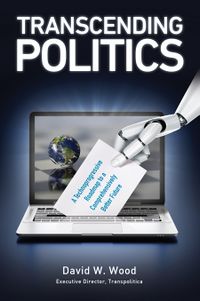Chapter 5. "Surveillance and security"

Chapter 5. "Surveillance and security" is the title of the fifth Chapter in the book Transcending Politics by David Wood.
"Connectivity has its advantages. Consider the needs of hard-pressed parents, who must periodically break away from other tasks to check how well their baby is sleeping. Remote baby monitors, plugged into domestic networks, can cut these parents some slack, by guaranteeing to alert them if their child wakes unexpectedly. Other systems, using small sensors in a “smart sock” worn by the baby, can provide additional assurance about the baby’s heart rate and blood oxygen level. This can reduce anxiety about sudden cot death. The vendor’s website explains, “More data, less worry: 83% of parents report having better sleep while using the Smart Sock on their baby”.
What’s not to like about this innovative use of connected technology?"
- - David Wood, Executive Director, Transpolitica[1]
The perils of connectivity
Let’s reflect on the predicament experienced by more than 100 car owners in Austin, Texas, as a result of the actions of a disgruntled former employee of used car retail firm Texas Auto Center.
Big Brother is watching
We are being monitored as never before. We've grown accustomed to CCTV cameras that allow security officials and property owners to keep an eye on goings-on. We're aware that online companies use cookies to keep track of our interactions with websites.
The Internet of Insecure Things
How bad can things become? Renowned management consultant Tom Peters foresees that a "catastrophic cyber disaster" is almost inevitable sometime in the next five to ten years. With rhetorical flourish, he tweeted that the only people who would deny this eventuality where "silicon kool-aid drinkers" who were "clueless, dangerous fools. [2]
Taking control of surveillance and security
What steps should we be taking, in the face of so many challenges to the security and wellbeing of our connected infrastructure?
Small thinking won’t save the Internet
If you're still unconvinced about the grave risks posed to our collective security by flaws in the networks and that connect more and more aspects of our lives, you should take the time to read the 2015 book Future Crimes[3] by Marc Goodman.
Controlling military AI
I'll drop this chapter towards a close by reviewing 2 ways in which the problems of insecure unsafe software could be even more significant than what's already been covered the first of these is when the software is connected to military armament
Controlling superintelligent AI
But wwhat about software with a very different mission? For example, is there any risk from software with the mission to calculate the optimal stock market investment strategy for a company? How about calculating the optimal set of marketing messages to boost the revenues for that company? What could go wrong if there are bugs in such software?
Raising awareness of the threat landscape
The positive news about existential risks posed by malfunctioning superintelligence is that a number of clear and accessible books on this subject have been published in the last few years. These include:...
Towards truly beneficial AI
In early January 2017...meeting was taking place in Asilomar, California...organized by the Future of Life Institute [4] and had the title "Beneficial AI 2017". AI researchers from academia and industry spent five days in workshops with thought leaders from the fields of economics, law, ethics, and philosophy.
External links
- Buy the Book
- For convenience of readers, this page lists all the endnotes from Transcending Politics, in easily clickable form.
References
- ↑ https://transpolitica.org/
- ↑ https://twitter.com/tom_peters/status/820440755214827521
- ↑ “Future Crimes” http://www.futurecrimesbook.com/
- ↑ “Beneficial AI 2017” https://futureoflife.org/bai-2017/